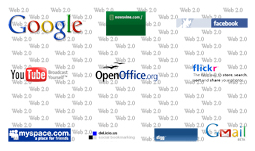Web 2.0: Is it changing the world?
- December 5, 2006
- |
- Matt Cook, Technical Editor
- Section: Technology
Ever stop to think about the difference between Web sites from the 90s and sites that are around today? The difference lies in a complete change in thinking about how to use the Internet that began to evolve in 2004: Web 2.0.
Most people have no idea how Web 2.0 has changed their lives and are most likely never going to be interested as long as they can keep their Myspace accounts and post photos to Flickr.com. But for the curious few who wonder what this “Web 2.0 junk” is all about, I visited a couple of my favorite Web 2.0 sites – Google and Newsvine– to find out more.
It turns out that the concept of Web 2.0 came into being after the dot-com bubble deflated in 2001 when many online companies began closing without ever making a profit. When these sites failed, it became apparent that the original concept of the Internet (Web 1.0) was not working. Pages were too static and the individual user was too far removed from the process.
In an effort to move away from the failing Internet concepts, O’Reilly Media and MediaLive International held a conference to discuss where the Internet was headed and how to make it work for an ever changing audience. Their ideas came from sites that survived the bursting bubble and included such principles as tagging, ranking pages, blogging and users contributing content that enhances the online experience for all. These ideas caught on fast.
Now that Web 2.0 sites have boomed, they allow users to contribute all types of content ranging from pictures (Flickr.com) to encyclopedia articles (en.Wikipedia.org) to personal information (myspace.com and facebook.com) to open source software (openoffice.org).
If one stops to think about how Web 2.0 drastically impact college and high school students alone through Myspace and Facebook it becomes obvious that we of the future generations of the work force and leadership of the world are becoming increasingly connected to people outside our normal circles of influence and in time can become truly global.
The Web 2.0 concept was and is a success because the Internet has grown in the years since the Web 1.0 burst and online communities are thriving. The Internet takes up an increasingly large part of peoples’ day.
So what does the future hold? Many analysts are already hailing Web 2.0 as finished and are awaiting a “Web 3.0” concept to arrive only to wow users yet again for entertainment and online shopping.
A lot of debate will take place on blogs and news media sites over whether Web 3.0 is really necessary since so many Internet users are satisfied with what is available to them online. No one knows for sure what the future of the Internet may be, but for now suffice it to say that Web 2.0 is making our lives a lot easier, faster and interconnected.
